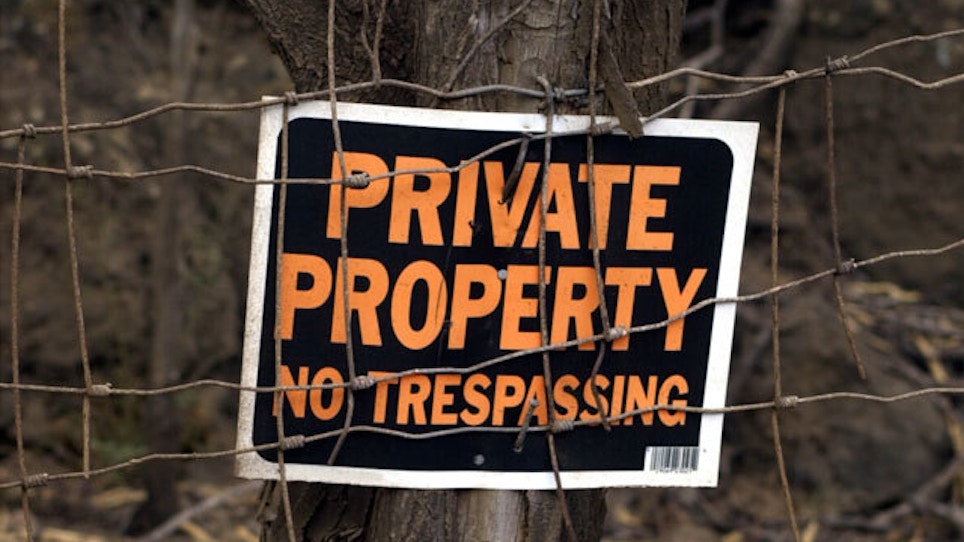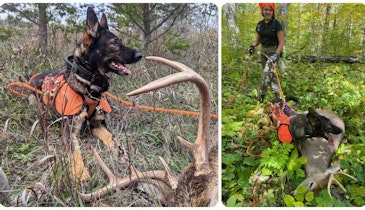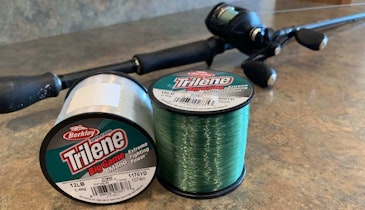Bad Approach No. 1: The Lazy Hunter
My dirt driveway is long, and my mailbox is at its base. One evening as I stopped to check for mail just at dusk, a man driving an SUV pulled up next to me. It was the Saturday of Thanksgiving weekend, just before the Monday opener of the Pennsylvania rifle season.
"Hey, I've been meaning to talk to you," he said, before identifying himself as someone who worked at a local business. " was wondering if it would be okay if I took a walk through your property a couple times during the season."
"No," I answered, barely allowing him to reach the end of his sentence. During the four years since purchasing the small farm, I'd had my fill of trespassers — but at least this guy had asked. And he was a neighbor. So I offered him an opening.
"There are already a couple people who will be hunting here, and they are people who have helped out during the year," I said, by way of explanation. "If you want to hunt here next year, all you have to do is help out — I'm always clearing fields, moving stands, so just give me a call."
"Nah," he said, as if the very idea disgusted him. "I got lots of other places I can go."
Well, I thought as I put my truck into drive, go there, then.
Bad Approach No. 2: The Surprise Visitor
The dogs started barking and I heard a vehicle door slam. I went to the kitchen door and stepped into the yard.
"Hi, remember me? I delivered your propane," the man said. "My son and I are looking for a place to hunt this year, and I thought of you and this farm."
I don't think so.
Bad Approach No. 3: The Liar/Trespasser
I had just moved a tree stand and was standing on it, making plans for trimming shooting lanes, when I spotted someone walking through the woods. I hugged the tree, keeping an eye on the person.
He walked directly to an old wooden tree stand (I have since torn down all of the old wooden tree stands on the property, since I won't allow anyone to hunt from one), climbed the steps and tested the strength of the platform. He climbed down and continued his walk, taking a route that would take him past my new stand at about 100 yards.
I quickly slipped down the steps from my stand, hoping to keep its location a secret. I intersected the trespasser's route and confronted him. What was he doing in my woods?
Aw, he was just hunting for mushrooms, he said. I feigned ignorance. Where did someone find these mushrooms, I asked, did they grow in trees? When he replied that they didn't, I asked him what he'd been doing up in the tree testing out the old wooden stand, and he didn't have an answer for that one.
Many people long to find a honeyhole to hunt on private land. Many private landowners, whether they hunt or not, are sick of hunters — or at least sick of the type of hunters they've encountered. If you want to bust that stereotype, embark on your quest to hunt private land knowing that you might have a long row to hoe.
The Lazy Hunter waited until just before the season to seek access. The Surprise Visitor showed up unannounced at the landowner's residence. The Liar/Trespasser proved his character by sneaking around on private land, and then lying about his reason for doing so.
These examples might be typical of the "hunters" that the landowner has met to date. The landowner might have never had contact with, well, people like you — who love deer hunting enough to purchase a magazine about deer hunting.
Getting permission to hunt behind the No Trespassing posters isn't going to be easy, and it could take time, sometimes a year or more. Don't be The Lazy Hunter, waiting until just before the season. Recognize that the effort to gain permission to hunt private land might mirror your toughest hunt, and as is common with many hunts, start at the beginning.
Related: 4 Ways To Avoid Phony Hunt Ads On Craigslist
Scout And Research
Your "hunt" begins in choosing a farm or piece of land to hunt and finding out who owns it. Don’t limit yourself to places which are already "honeyholes" — keep a mindset that should you gain access, you might be able to make improvements to the land. And don't write off places where others have tried and failed — your approach is going to be better than average.
Finding out who owns the land can be as simple as getting a name from a mailbox. If that's not an option, your next step is to search for the owner using a computer, or by making a trip to the county courthouse if you don't have a computer.
An office in the courthouse, usually the recorder of deeds, will have a list of all properties which can be searched using the owner's name or the property's physical address.
And then what should you do? Drive up? Make a phone call? The answer to both of these approaches is no. Remember Bad Approach No. 2, The Surprise Visitor?
I would venture a guess that most people who have purchased private land share a mindset — they treasure their privacy and space. Simply driving up and knocking on the door will most likely start you off on the wrong foot. Snooping around in the woods without permission, as in Bad Approach No. 3, could get you arrested.
What's the first step? You should actually write a letter. The envelope you send the landowner should include your letter, your resume and a SASE (self-addressed stamped envelope) for the landowner's response.
Sample Letter
Dear ________,
My name is ________________________ and I am interested in hunting on your property. I feel that hunting on private land is a privilege which should be earned, and I am willing to help you out with projects on your land.
Next, describe the type of help you're willing to provide. Can you run a chainsaw? Do you have a pickup truck? Think out of the box — not just with help on the farm, but with any business associated with the farm. For example, is it an orchard? Can you drive a tractor trailer, help with taxes and accounting, unload hay wagons, prune trees, cut hair, design a website, or help with animal care?
In the next paragraph, describe yourself and your hunting career. How long have you been hunting? Do you belong to groups or clubs? Let the landowner know you'll abide by his requests. A farmer who grows a vegetable patch for his farm stand might ask that you shoot does. Yes, you want a buck, but sometimes you have to "earn a buck." Also, that you'll only hunt on the days and times the landowner specifies — maybe the landowner doesn't want someone coming onto the property at 5 a.m. Some landowners, such as a farmer with animals, might be against rifle hunting but will accept archers.
In your final paragraph, state that you hope to talk to the landowner by phone or in person, and that you hope for a response from your letter, be it yes or no. Be sure to provide your name, address, home and cell phone number and email address if you have one. Make it ridiculously easy for the landowner to respond by including a stamped postcard, addressed back to you, for the response.
Sample Resume
This doesn't have to be the glittering gem you'd send to prospective employers, but it should include the same basic information. This should include your name, address, phone numbers and email address; your place of employment and its address, and the length of time you've worked there; any professional associations and memberships, and also hobbies — anything that proves you to be a good person and supports your effort to gain access to the land. For example, Lifetime NRA member, Veteran, Member of No Gutters Bowling Team, Green Acres Sportsman's Club, etc.; and finally, references and their contact information.
First Contact
If you're fortunate enough to set up a meeting, don't blow it now. Although a suit and tie aren't expected, you should make an effort to make a great first impression. Be on time, wearing clean clothes. Dress on the assumption that the landowner is a non-hunter, and might have had a bad experience with hunters — stay away from the blaze orange and camouflage for that first meeting. Don't smoke. Cover the tattoos. Shake hands, make eye contact, introduce yourself and immediately thank the landowner for meeting with you.
If you're meeting at the farm, keep your eyes peeled for incomplete projects — and be quick to offer your help. If nothing catches your eye, ask questions such as, "What keeps you busy in the winter/spring/summer?"
During And After The Season
If you're lucky enough to gain access to the land, keep the landowner updated with your season. Let him know what game you've seen and if you've been successful. And it goes without saying that you should offer to share the harvest. If the landowner doesn't enjoy deer meat, he would certainly enjoy a thank-you card with a gift certificate to a local restaurant or department store. It doesn't have to be for some huge amount of money — as the saying goes, it's the thought that counts. Don't forget the holiday card in December.
Before I got my little farm and had just moved back to the area, I aspired to hunt a local dairy farm. No way, hunting buddies told me, that guy never lets anybody hunt there. My travels often took me past the farm, but because of the owner's reputation as a hunter hater, I had thrown in the towel.
I'd noticed an aged English setter on the farm's porch and one day as I drove past, I saw that the dog was tottering along the road and was steps away from entering a T intersection. I stopped, got him by the collar and led him back to the house.
Yes, I wanted to hunt the farm. I am a dog lover too, though, and would have done the same thing for any dog, anywhere. The dairy farmer was home and took the dog from me, thanking me. He seemed pleasant, not the hostile guy my friends had described.
There was no time like the present. I told him I was interested in hunting the farm, and his demeanor immediately changed. He did get hostile and said he was sick of hunters. As he was describing all the wrongs hunters had done on his property over the years, I was looking down.
That's when I noticed how long the grass was, and I looked up at him.
"Do you need help with your lawn?" I asked, and he just stood there, dumbfounded. I hurried to plead my case. "If I could hunt here, I would cut your grass all summer long," I promised.
Turns out that I'd hit pay dirt. After milking, feeding and cleaning up after the cows, the last thing he wanted to do was cut the grass. Was it a pain in the butt to load up my mower every week or so, drive over there and cut the grass? Yes. Did the lawn look nice, and did that please the landowner? Yes.
Somewhere, there's a piece of land you'd love to hunt, and on that piece of land, there's a chore or project that no one wants to do or can't do alone. This is your off-season hunt challenge — find it. It may be the most rewarding scouting you ever do.






